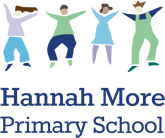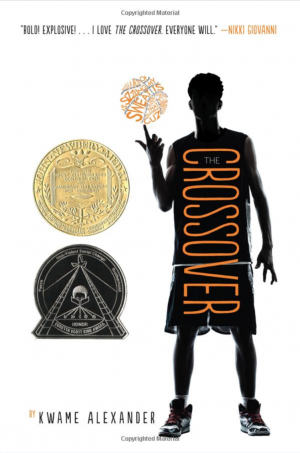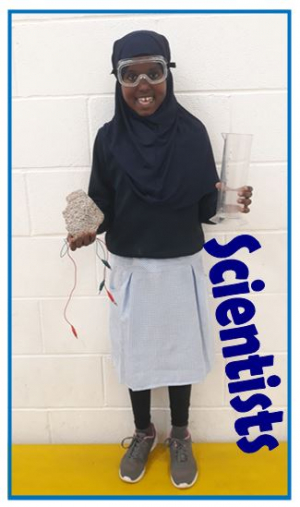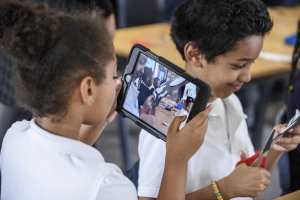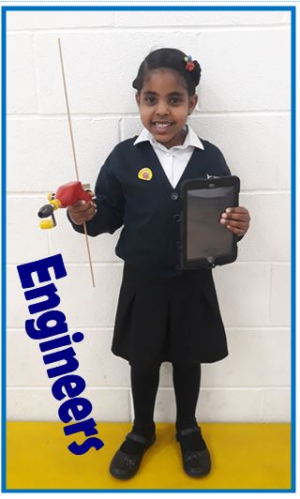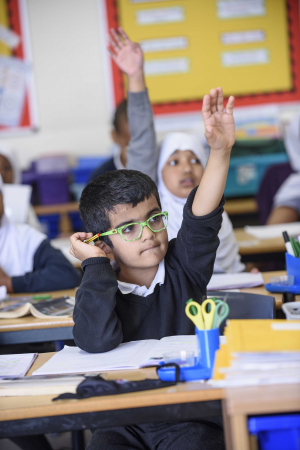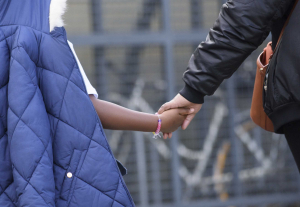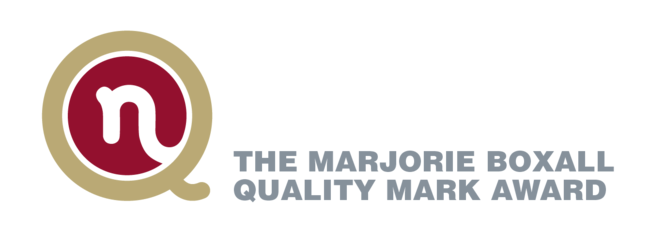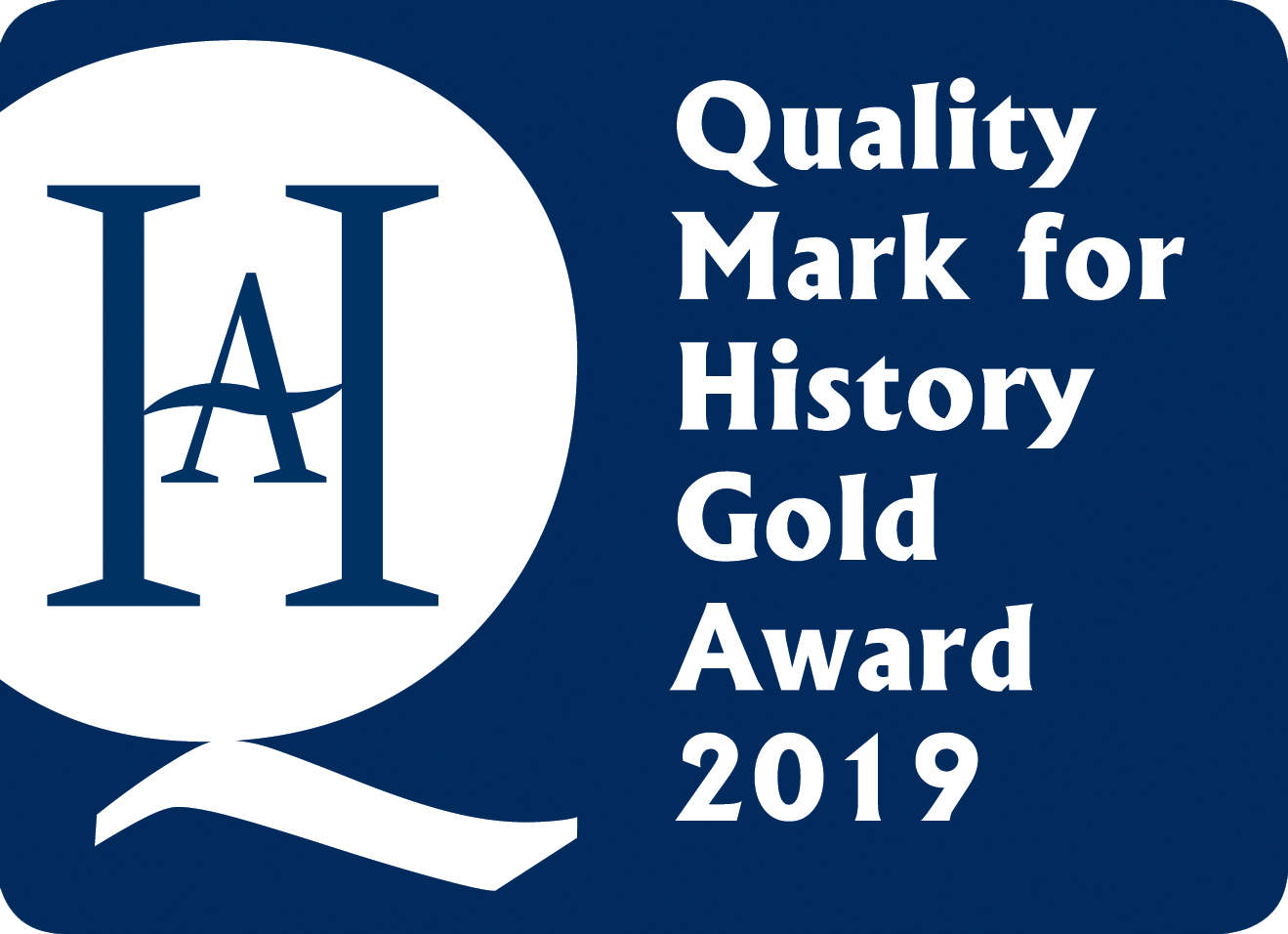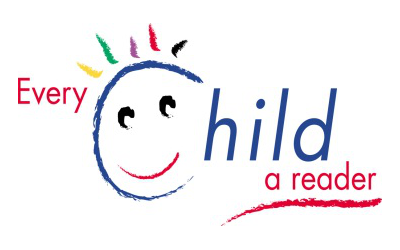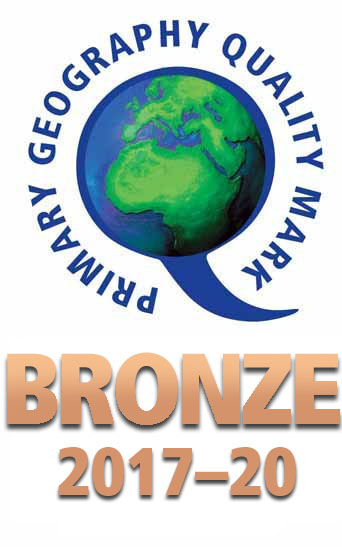
Kelly Paterson
Open days
Are you looking for a Reception place for your child in 2025?
We'd be delighted to show you our nurturuing, inspiring environment, and give you the opportunity to find out more about our school.
The Crossover
‘With a bolt of lightning on my kicks . . . The court is SIZZLING. My sweat is DRIZZLING. Stop all that quivering. Cuz tonight I'm delivering’
Being Scientists at Hannah More
Intent
Science at Hannah More inspires, excites and develops children’s curiosity whilst teaching them the knowledge and skills they need to take advantage of the opportunities, responsibilities and experiences of later life. In their lessons, children are not passively taught science but rather become Scientists in active, practical sessions that allow them to discover knowledge for themselves through their application of scientific skills. We endeavour to use Science to build cultural capital and provide children with valuable life experiences that will enable them to become socially mobile in later life. Children study famous scientists and are taught about how the topic they are studying links to scientific career paths. We place a strong emphasis on learning about our local area to allow children to make connections in the place they live and know what scientific links there are in their community that they could utilise when they are older. At Hannah More, Science is taught with a strong emphasis on Oracy, which enables our pupils to develop understanding and articulate their ideas in order to better understand the world around them.
Implementation
Science is taught throughout three science enquiries during the year for most year groups except for Year Four and Six who have four science enquiries. At Hannah More we use a flexible timetable so science may be taught for seven hours one week and two the next, in order to interweave it into English and other enquiry subjects in a systematic and sequenced order that builds on children’s knowledge and skills. Science skills as set out in the National Curriculum are not taught separately but used as a vehicle for children to discover knowledge. Throughout their enquiry children ask questions and decide which type of scientific enquiry would be best to answer them including observing over time, pattern seeking, identifying and classifying, researching using secondary sources and conducting comparative and fair tests.
The teachers and subject leader have high expectations of every pupil and learning is challenging to ensure that every child is extended. The needs of every child are identified and steps are taken to ensure that these needs are met. In science, this can involve; pairing non-technical and technical vocabulary, visual aids, breaking learning into smaller steps and providing additional resources when needed. Children working at greater depth level in science will be extended with challenges which requires them to reason more deeply about the learning covered in the lesson.
Science at Hannah More is taught in a way that drives children’s curiosity and enjoyment in science. Alongside the enquiries, children’s engagement in science is fostered by STEM week, Nature Clubs, Eco-committee and weekly news assemblies which often touch on scientific discoveries. Our large school grounds are used frequently to assist in the study of plants, life-cycles, animals and the seasons. We also teach children about broader world issues such as climate change and plastic pollution and in this way develop them as responsible and active citizens. Children’s learning and engagement is also fostered through science trips to places such as Science Creates, the Bristol Botanic Gardens and We the Curious.
During EYFS, pupils explore the natural world through a combination of child initiated and adult directed activities.
They have the opportunities to:
- Observe closely and record findings through drawings
- Identify plants, animals, the weather, seasons and materials and explore similarities and differences between them
- Observe the lifecycle of plants and animals
- Explore changing states of matter
- Begin to learn how humans should stay healthy
Impact
Formative assessment is used throughout an enquiry by teachers to ensure that key concepts are understood and children have a thorough, rather than superficial understanding of the topic they have studied. Throughout an enquiry, lessons are flexible so that teaching can be adapted in light of this assessment in order to respond to a class’ learning and clear feedback is given to ensure that any gaps or misconceptions can be addressed. In addition to ongoing assessment, children carry out a ‘cold task’ at the beginning of each enquiry to share what they currently know and repeat this as a ‘hot task’ at the end to demonstrate what they have learnt. This provides the teacher with information about which children have made good progress throughout the enquiry, who has a secure understanding and what gaps might still need to be filled. As a result, pupils leave Hannah More with a deep understanding of the topics covered and are able to transfer this knowledge to a range of situations, skills and subjects.
At Hannah More we develop a secure foundation in biology, chemistry and physics. Our pupils demonstrate a love of science and a desire to widen their knowledge through questioning. Due to their knowledge of scientific processes they are able to avoid misconceptions and can explain why they are not correct using rich scientific vocabulary. Additionally, they can plan, carry out and present scientific experiments, using their knowledge to inform them. In this way children will be equipped with the scientific skills and knowledge needed for the start of secondary school and their future beyond Hannah More.
Assembly music 2021 - 2022
Each week we listen to different music in assemblies and we learn a little about each piece - the music itself and the musician. Below you can read about the most recent music we have been listening to.
Being Engineers - Computing at Hannah More
Intent
At Hannah More, we recognise that the world of technology is ever changing and evolving. In order to best prepare our learners for their futures, we aim to give them a wide range of opportunities to gain computing knowledge and develop their skills.
Our Computing curriculum focuses on a progression of skills in coding, computing in the wider world and creating media to ensure that children become competent in all aspects of the curriculum. These strands are revisited repeatedly during children’s time in school to ensure the learning is embedded and skills are successfully developed. Oracy is embedded throughout the teaching of computing by using talk tactics to promote and scaffold computational thinking.
Online safety is at the heart of our Computing curriculum. Through our termly focusses we equip our students with the necessary skills to be safe, responsible and respectful when using the internet. Our intention is that Computing also supports the children’s creativity, engages them in their wider curriculum learning and enriches their experiences in school.
Implementation
We follow a broad and balanced Computing curriculum that builds on previous learning and provides both support and challenge for learners. To best implement the computing curriculum we use a variety of schemes such as Espresso coding, TeachComputing and Project Evolve E-safety.
There are termly computing themes which are followed across KS1 and KS2, as fortnightly 45-minute lessons.
Term 1 and 2: Coding using Espresso coding.
Term 3: 6 E-safety lessons as part of our Skills for Life (PSHE) curriculum
Term 4, 5 and 6: Computing systems and networks, data and information and creating media
In addition, each term has an E-safety focus in which there is an assembly and in-class lesson based on topics adapted from the Project Evolve scheme of learning.
At Hannah More, we want to ensure that Computing is embedded in our whole school curriculum and that opportunities for enhancing learning by using technology are always taken. Therefore, every year group has at least one computing enquiry outcome, for example: filming documentaries, googles slides presentations and crumble board designs.
During EYFS, pupils being to develop their understanding of computing through a combination of child initiated and adult directed activities.
They have the opportunities to:
- Take photos on cameras or tablets
- Play games on the interactive whiteboard
- Explore mechanical toys
- Watch video and music clips
Impact
At Hannah More children enjoy and value Computing and know why they are doing things, not just how. Children will understand and appreciate the value of Computing in the real world. Viewing computing in different learning contexts such as creating graphs in science, documentaries in history and presentations in English, as well as authentic contexts, such as meeting experts in the computing field allows children to see themselves as designers, engineers, coders and have high aspirations for themselves. Progress in Computing is demonstrated through regularly reviewing and scrutinising children’s work, primarily through:
- Observing how they perform in lessons
- Pupil voice
- Floor book monitoring
How we teach Languages
Learning a foreign language provides an opening to learn about other cultures.
At Hannah More, we believe that with our high-quality language education, we foster children’s curiosity and deepen their understanding of the world.
The foreign language taught at Hannah More is French. This language is taught in Key Stage 2.
Our French lessons enable children to express their ideas and thoughts in another language and to understand and respond to others, both in speech (Years 3 and 4) and in writing (Year 5 and 6).
We also provide opportunities for children to communicate for practical purposes, learn new ways of thinking and read books written in French.
In French lessons, children are taught to:
- listen to spoken French language
- explore the patterns and sounds of language through stories, songs, poems and rhymes
- Have a simple conversation; ask and answer questions; express opinions
- speak in sentences, using basic, familiar vocabulary and phrases
- develop accurate pronunciation of words so that others can understand them
- broaden their vocabulary and develop understanding of new words
- use a French dictionary confidently
- describe people, places, things and actions
- write phrases from memory and create new sentences
Being Engineers - Design Technology at Hannah More
Intent
At Hannah More we intend to give children the opportunity to develop original ideas and to design and make real products for people in our community. They are able to use their creativity, imagination and evaluation skills in each project by following the six interrelated DT principles of user, purpose, functionality, design decisions, innovation and authenticity.
The curriculum is designed so that DT is connected to a range of other subjects which enables children to link ideas and further their knowledge of the topic. This is supported through a strong emphasis on Oracy which ensures that children are able to confidently explain their design choices as well as their plans for making their product using the correct technical vocabulary.
Our DT curriculum provides rich learning opportunities within the local community from meeting a local milliner to studying the chocolatier J.S Fry who founded his company in Bristol. Through meeting and studying engineering experts, linking projects to real life experiences and giving children cookery and engineering opportunities outside the classroom we build cultural capital for our pupils. By providing life skills such as innovation, self-evaluation and an awareness of healthy eating through our DT lessons we aim to prepare pupils for the opportunities, responsibilities and experiences of later life.
Implementation
DT at Hannah More is taught throughout two or three enquiries during the year. One of these will be focused on cookery and nutrition and the rest on mechanisms, structures, textiles or electrical systems. The lesson can be stand alone or mixed with other subjects such as science, history or English. Throughout their DT lessons the children engage in an iterative process; firstly investigating the target audience and exploring existing products before moving onto the cyclic process of designing, constructing and evaluating (see right). Lessons are planned to ensure six DT principles are followed, with children considering the user, functionality, purpose and authenticity of their product as well as being able to make design decisions and innovate. Safety is explained and modelled at the start of and throughout each project including food hygiene instructions.
As a school, we promote Design and Technology in the wider school through:
- Trips and Visitors for example a shadow puppet designer in Year 3.
- Clubs such as sewing club and papier-mâché club.
- STEM Week where year groups have a construction project linked to their enquiry such as to build an aqueduct that carries water in Year 3 or a floating, sail-powered ship in Year 6.
- Arts Week where each year group has a cookery project linked to a continent they are studying. During this week they may also have a further project linked to structures, mechanisms or textiles that reinforces previous learning.
During EYFS, pupils explore and play with a variety of media and materials through a combination of child initiated and adult directed activities.
They have the opportunities to learn to:
- Use different media and materials to express their own ideas
- Be able to construct simple structures
- Use a range of small tools including scissors effectively and safely
- Begin to explain what they have constructed
- Prepare simple dishes safely and hygienically
Impact
Through our teaching of DT at Hannah More we aim to develop critical thinkers who are able to create and evaluate designs in the real world. Formative assessment is used throughout a DT enquiry to assess pupil’s skills and knowledge. Feedback is regularly given in verbal and written form and so children can make adjustments to aid better progress in their learning. By Year 6, pupils have gained the knowledge and skills required to problem solve by designing and creating products and can apply knowledge from other areas of the curriculum to help them succeed. They can work safely, hygienically and confidently using a variety of tools and materials. By enabling our children to ‘be engineers’ at school we open the door for them to become architects, designers, chefs, technicians and inventors as adults and allow them to thrive in an ever-changing technological world.
Being Philosophers at Hannah More
Intent
At Hannah More, Religious Education has a significant role for the development of pupils’ spiritual, moral, social and cultural development. It promotes respect and open-mindedness towards others with different faiths and beliefs and encourages pupils to develop their sense of identity and belonging through self-awareness and reflection.
In line with the Bristol Agreed Syllabus for Religious Education, R.E. lessons at Hannah More provoke challenging questions about the meaning and purpose of life, beliefs about God, ultimate reality, right and wrong and what it means to be human. We encourage pupils to learn about religious and non-religious worldviews in order to discover, explore and consider different answers to these questions. Pupils then learn to interpret, analyse, evaluate and critically respond to the claims that religious and non-religious worldviews make.
Much of the discussions that take place during R.E lessons are underpinned by our Oracy talk structures. These help pupils to express their opinions and to agree or disagree respectfully. In addition to this, visits to different places of worship within our local area help to bring Religious Education to life and play a part in developing the children’s cultural capital.
Implementation
We use the Locally Agreed Syllabus of Awareness Mystery Value for Religious Education developed for Bristol as the basis for our curriculum. At Hannah More Primary School, it has been agreed, having considered the requirements and guidelines presented in the Agreed Syllabus, that the following religions are studied:
- Christianity
- Islam
- Judaism
- Hinduism
- Buddhism
- Sikhism
- Humanism
These are taught through one specific ‘RE Day’ each term. Where there are religious celebrations such as Diwali, Christmas, Eid or Easter, extra RE Days are taught based on these themes.
Lessons are structured in such a way so that children across the school are both learning about religion and beliefs and learning from religion and beliefs. Children learn about religion and beliefs through exploring a range of religious stories, texts and celebrations, recognising similarities and differences between and within religions and learning about how religious practices are related to beliefs and teachings. Children learn from religion and beliefs by reflecting on what matters to them, reflecting on the moral values of rights and wrong and recognising that there are similarities and differences between theirs and others lives.
As well as learning about RE through specific RE lessons, children at Hannah More are also provided with a range of extra experiences and enrichment opportunities that contribute to their RE learning. These include having the opportunity to handle artefacts, explore texts, meet visitors from local religious communities, participate in quiet reflection during assemblies and make visits to local places of worship.
During EYFS, pupils explore religious education through a combination of child initiated and adult directed activities.
They have the opportunities to:
- See and understand themselves as a special and unique individual
- Talk about themselves and members of their community
- Understand that some places are special to members of their community
- Recognise that different people hold different beliefs and celebrate differently.
Impact
The children at Hannah More enjoy learning about other religions and why people choose, or choose not to follow a religion. Through their R.E. learning, the children are able to make links between their own lives and those of others in their community and in the wider world. They develop a religious vocabulary and interpret religious symbolism in a variety of forms and reflect on questions of meaning, offering their own thoughtful and informed insights into religious and secular world-views.
Children’s work in RE is assessed while observing them working during lessons. Questioning is used to form part of the teacher assessment and evidence is collected in pupils exercise books and the class floor book which acts as a ‘snapshot’ of the learning that takes place.
PSHE at Hannah More
Curriculum Intent
At Hannah More we offer an ambitious PSHE curriculum that equips all children with the knowledge and skills they need for understanding themselves and the world around them. Our curriculum has been created using not only the recommendations of the PSHE Association, but also taking into account the specific needs of our wider community. The content has been selected in consultation with the whole staff team to ensure that we address the gaps in skills and understanding that have been observed on a daily basis.
Our tailored curriculum has been written with the community at its heart and embraces the diversity of our school population. By incorporating an oracy outcome in every lesson, we embed speaking and listening skills, which prepares all children to be confident communicators in a range of situations. Cultural capital is built by providing the children with age-appropriate information about the world around them in order to successfully navigate their way independently. The oracy and discussion outcomes allow the children the chance to share their own experiences and views as well as accommodating those of others.
Implementation
When we designed, mapped out and created our bespoke PSHE curriculum named Skills for Life, we used the objectives from the PSHE Association for the basis of our curriculum. Alongside the use of the PSHE Association, the curriculum was also crafted using a whole staff collaborative approach. Through staff training opportunities, all staff including senior leaders, subject leaders, teachers, teaching assistants and the wider staff worked together to collate stimuli and discussion topics in order to meet the needs of our children and community using the six themes. Each scenario and discussion has been designed to be relevant and relatable to the children’s real world contexts. Our bespoke curriculum provides children with an overall theme each term:
- Managing Emotions
- Communicating with Others
- Staying Safe and Healthy Online
- Building a Healthy Mind and Body
- Understanding Differences
- Exploring Money and Careers
Each term has a unit of six lessons. Each lesson has a fixed structure with an oral outcome and/or a personal reflection. Each lesson is taught by the class teacher and is compulsory for all children. The structure of each lesson is as follows:
- Starter game- mostly inspired and taken from JIGSAW content for social and emotional skills.
- A visual/audio/scenario-based stimuli for providing contextual inspiration.
- A structured discussion often based around the stimuli using our Voice 21 Oracy stem sentences.
- Written personal reflection in Skills for Life personal journals.
- After school parent feedback using the Marvellous Me app to encourage conversations around the themes at home.
Impact
The Skills For Life lessons at Hannah More provide the children with the opportunity to learn about, discuss and reflect on the personal, social, economic and health-related issues surrounding each termly theme:
- Managing Emotions
- Communicating with Others
- Staying Safe and Healthy Online
- Building a Healthy Mind and Body
- Understanding Differences
- Exploring Money and Careers
The bespoke curriculum uses the same themes across the year groups but has differentiated objectives and content that progresses through the year groups at an age appropriate level of content and discussion. This is to encourage children’s mastery in knowledge and awareness of each theme as they move from EYFS to Year 6. For example, within term 4’s theme: Building a Healthy Body and Mind, the first lesson for each year group is called ‘My amazing body and mind.’ Year 1’s learning objective is ‘I understand the human body can do amazing things and I need to take care of mine.’ Whereas the Year 6 objective for that lesson and term is ‘I understand how speaking a second language can improve my brain.’ This shows that as they move through the school, the children will be developing and building on their PSHE knowledge until they get to Year 6, where they would have encountered a wide variety of stimuli, information, discussions and reflections on all six themes.
The themes and the content within each one was carefully researched and planned with our children’s context at heart. The PSHE lead has ensured that relatable and accessible scenarios and contexts are used through the lessons to ensure that the children at Hannah More able to progress with their personal, social, economic and health-related understandings because it is relative to their context. This allows for them to connect with the content at a deeper level and provide them with a skillset that is appropriate for their future.
The impact of this bespoke curriculum is closely monitored by the PSHE lead and the deputy headteacher to ensure that necessary amendments are made to ensure that it is serving the best purpose it can. During every lesson, the teachers use assessment for learning strategies such as the oracy stem sentences (Voice 21) through questioning and discussions. Also, through the personal reflections made in the children’s Skill For Life journals. In the school year 2023-2024, the PSHE lead conducted a pupil voice before the bespoke Skills Fore Life curriculum was launched in early September and again in Term 6 at the end of the first year after all of the new content had been delivered.
